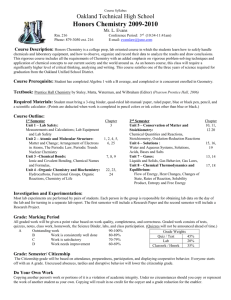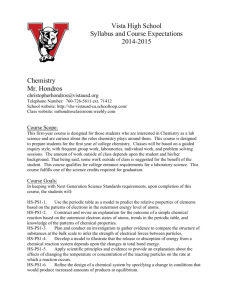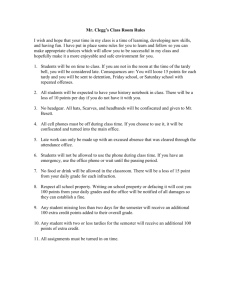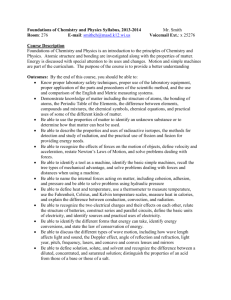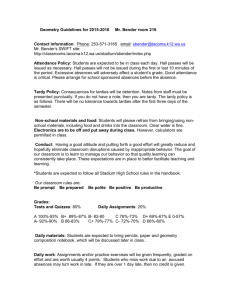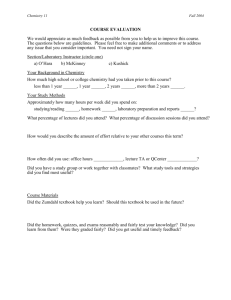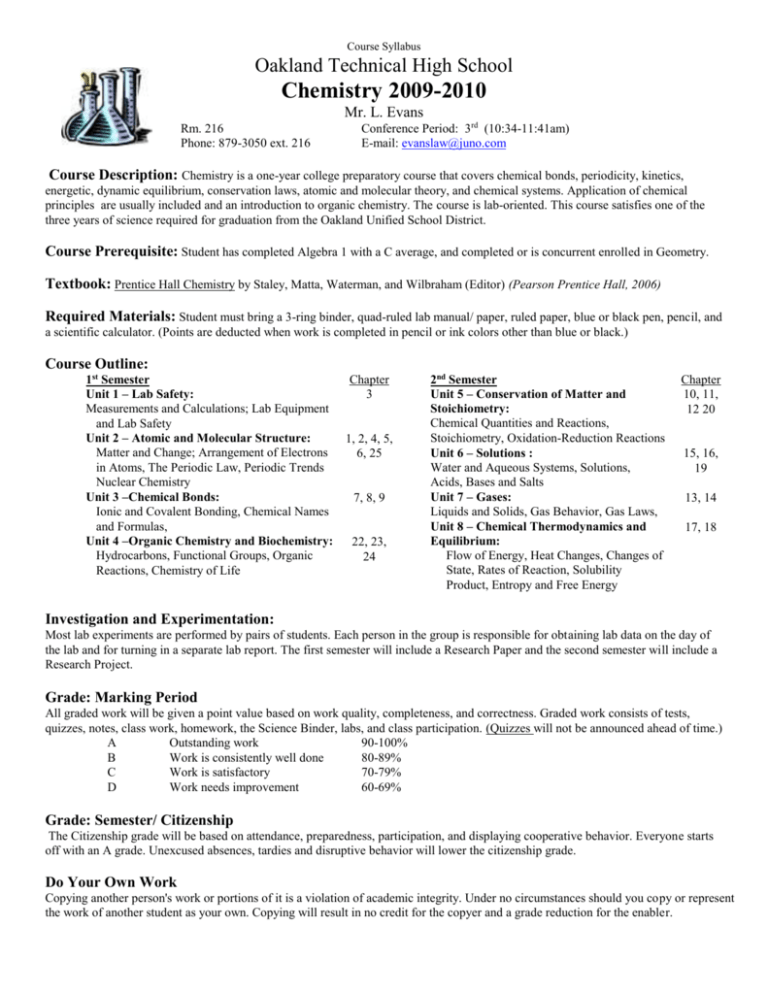
Course Syllabus
Oakland Technical High School
Chemistry 2009-2010
Mr. L. Evans
Rm. 216
Phone: 879-3050 ext. 216
Conference Period: 3rd (10:34-11:41am)
E-mail: evanslaw@juno.com
Course Description: Chemistry is a one-year college preparatory course that covers chemical bonds, periodicity, kinetics,
energetic, dynamic equilibrium, conservation laws, atomic and molecular theory, and chemical systems. Application of chemical
principles are usually included and an introduction to organic chemistry. The course is lab-oriented. This course satisfies one of the
three years of science required for graduation from the Oakland Unified School District.
Course Prerequisite: Student has completed Algebra 1 with a C average, and completed or is concurrent enrolled in Geometry.
Textbook: Prentice Hall Chemistry by Staley, Matta, Waterman, and Wilbraham (Editor) (Pearson Prentice Hall, 2006)
Required Materials: Student must bring a 3-ring binder, quad-ruled lab manual/ paper, ruled paper, blue or black pen, pencil, and
a scientific calculator. (Points are deducted when work is completed in pencil or ink colors other than blue or black.)
Course Outline:
1st Semester
Unit 1 – Lab Safety:
Measurements and Calculations; Lab Equipment
and Lab Safety
Unit 2 – Atomic and Molecular Structure:
Matter and Change; Arrangement of Electrons
in Atoms, The Periodic Law, Periodic Trends
Nuclear Chemistry
Unit 3 –Chemical Bonds:
Ionic and Covalent Bonding, Chemical Names
and Formulas,
Unit 4 –Organic Chemistry and Biochemistry:
Hydrocarbons, Functional Groups, Organic
Reactions, Chemistry of Life
Chapter
3
1, 2, 4, 5,
6, 25
7, 8, 9
22, 23,
24
2nd Semester
Unit 5 – Conservation of Matter and
Stoichiometry:
Chemical Quantities and Reactions,
Stoichiometry, Oxidation-Reduction Reactions
Unit 6 – Solutions :
Water and Aqueous Systems, Solutions,
Acids, Bases and Salts
Unit 7 – Gases:
Liquids and Solids, Gas Behavior, Gas Laws,
Unit 8 – Chemical Thermodynamics and
Equilibrium:
Flow of Energy, Heat Changes, Changes of
State, Rates of Reaction, Solubility
Product, Entropy and Free Energy
Chapter
10, 11,
12 20
15, 16,
19
13, 14
17, 18
Investigation and Experimentation:
Most lab experiments are performed by pairs of students. Each person in the group is responsible for obtaining lab data on the day of
the lab and for turning in a separate lab report. The first semester will include a Research Paper and the second semester will include a
Research Project.
Grade: Marking Period
All graded work will be given a point value based on work quality, completeness, and correctness. Graded work consists of tests,
quizzes, notes, class work, homework, the Science Binder, labs, and class participation. (Quizzes will not be announced ahead of time.)
A
Outstanding work
90-100%
B
Work is consistently well done
80-89%
C
Work is satisfactory
70-79%
D
Work needs improvement
60-69%
Grade: Semester/ Citizenship
The Citizenship grade will be based on attendance, preparedness, participation, and displaying cooperative behavior. Everyone starts
off with an A grade. Unexcused absences, tardies and disruptive behavior will lower the citizenship grade.
Do Your Own Work
Copying another person's work or portions of it is a violation of academic integrity. Under no circumstances should you copy or represent
the work of another student as your own. Copying will result in no credit for the copyer and a grade reduction for the enabler.
Homework
A minimum of two hours each day should be spent on Chemistry. This includes time spent in class, lab, studying and homework.
Homework is due at the beginning of the class period. Late work completed after the beginning of the period: 70% of points available.
Make-up Policy
Homework will be accepted up to 1 week after its due date for 50% credit. Homework turned in after 1 week after its due date will not
be accepted. Homework will be accepted up to 4 days after its due date for full credit, providing the lateness was the result of a schoolsponsored activity, illness, or other legitimate excuse as outlined in OTHS guidelines for excused absences. Homework turned in
after this time will be counted as late.
Tests and quizzes missed as the result of legitimate, excused absences will be taken before or after school within 1 week of returning to
school. Tests and quizzes missed will be unavailable after this time. Tests and quizzes missed during unexcused absences will be
remade after school the day of the student’s return to school, or the following day before school in the case the instructor has an
afternoon meeting on the day of the student’s return. When a student does poorly on a quiz or test, the student can take one make up
test. On makeup tests the highest grade change that a student can receive is a “C”.
Blue Pass Policy
Students should take care of all their personal business (visiting counsellors, teachers, friends, restroom, etc.) before class or after
class. For each use of the blue hallway pass, the student loses two extra credit points.
Extra Credit
Extra Credit is incorporated with tests and quizzes. The aim is for students to do their best on all assigned work.
Paper/ Projects
Students will complete a RESEARCH PAPER 1st SEMESTER using the Big Six Organizer as a guide and RESEARCH PROJECT
with an Oral Presentation. There will also be a RESEARCH PROJECT and Oral Presentation in the 2ND SEMESTER.
Science Binder
Each student will be required to have an organized notebook in which to keep all class work and homework. The sections of the
notebook are a) assignment list, b) all assignments organized by number and c) reflections/ notes. The notebook will be collected every
other week and graded for organization and completeness.
Tardy Policy
Students not in their seats with the required materials when the tardy bell rings will be considered tardy. Students who are tardy interrupt
the teacher and the learning process of all students in the room. Tardies lower the citizenship grade and result in detentions.
Classroom Behavior
1. Be On Time
4. Be Prepared to Participate
2. Respect Yourself and Others
5. Observe All School Rules
3. Leave Food & Drink Outside
If You Choose To Break A Rule
a. Verbal warning and reminder
b. Contact parent by Phone
c. Referral or suspension from class
Cell Phone Policy
Students can use cell phones before school, at lunch, and after school. Parents and Guardians can contact students by calling the school
at (510) 879-3050 (extension 216 for Chemisty Class in room 216). You may NOT use your cell phone as a calculator. Any use of
your cell phone in class will result in a) its confiscation for the school day or b) student will report to office with referral.
Extra Help
Students should get the phone numbers, email addresses, and internet chat/messenger names of each member of their lab study group.
If you notice that a member of your group is not in class get handouts and take good notes for him/her.
The teacher is available at lunch or after school by request. The school also provides after school tutoring conducted by Tech students
and college students. Helpful web sites can be found at
1) http://www.wwnorton.com/college/chemistry/gilbert/home.htm [excellent tutorials]
2) http://www.chemmybear.com/groves/apchem.html [tests with answer keys]

